Animal control officers work around the clock to help all types of animals
Published 11:52 am Saturday, April 15, 2017
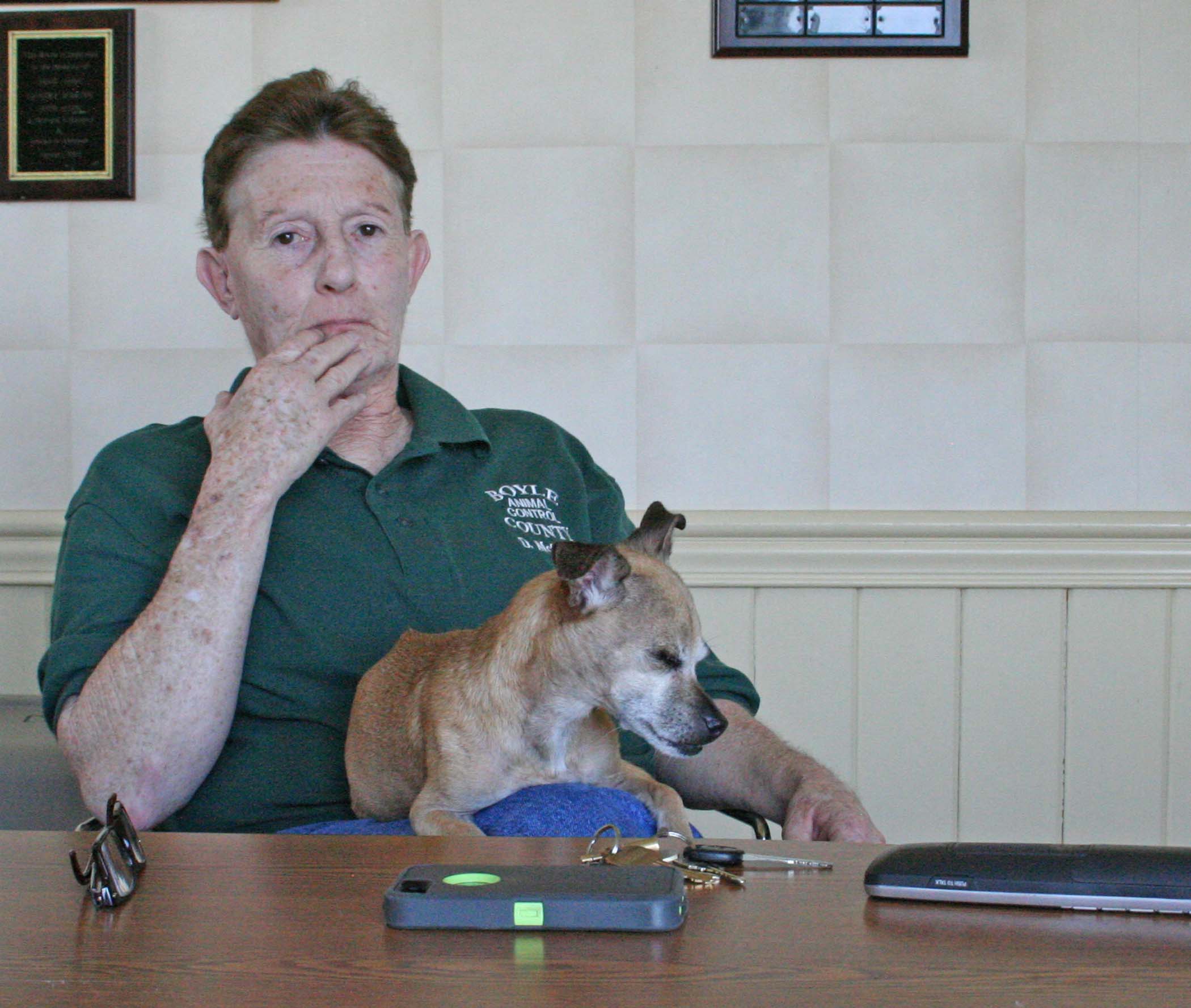
- Kendra Peek/kendra.peek@amnews.com Danville-Boyle County Animal Control Officer Debbie McCowan with "Trixie," a dog about 6 years old that lives at the shelter. Trixie has to have regular insulin shots. "I'll probably end up taking her home," McCowan said.
If long hours, like being on-call 24 hours a day, and risk of bite from animals (or their humans) sounds like a rough job, well, that’s just a normal week for Danville-Boyle County Animal Control Officers Debbie McCowan and John Hambel, and Director Dan Turcea.
The job is much more than just the bad, they said, as National Animal Control Officer Appreciation Week came to a close.
“The way I look at it, you have to endure a lot of looking at bad things and the rewards are the animals that go out of here in a good way. That’s the rewards,” Turcea said. “You have to put up with some of the bad to reap the good feelings.”
Stories begin
Turcea has been with the Danville-Boyle County Animal Control for about 20 years, the longest of the three.
“I worked with horses for a living for a long time, then I worked for a local veterinarian for a long time, and then this job came open,” he said.
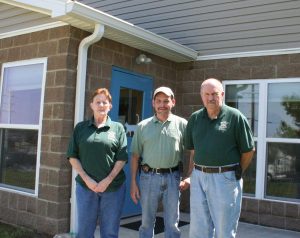
Kendra Peek/kendra.peek@amnews.com
Danville-Boyle County Animal Control Officers Debbie McCowan and John Hambel, with Director Dan Turcea, outside the Katherine E. Nelsen Adoption Center, at the Danville-Boyle County Humane Society. April 10-15 was National Animal Control Officer Appreciation Week.
McCowan is a close second at 16 years, although she’s been working in the field for longer — nearly 30 years.
And Hambel is the newest of the bunch at nine years.
“I’ve always been involved with animals; grew up on a horse farm. When this job came open, I applied for it. They crazily hired me,” Hambel said.
“And the rest is history,” Turcea added.
Although none of them pursued animal control school after graduating high school, both Hambel and McCowan are nationally certified animal control officers, Hambel said.
Long hours
It’s mostly just McCowan and Hambel who spend their time picking up animals these days, Turcea said, while he operates as their dispatcher during the day.
The two are on call, rotating which weeks, explained Hambel.
“We get dispatched after hours, by 911, for just about everything having to do with animals, not just dogs,” he said. “Cows are out, horses are out.”
Sometimes, McCowan said, it can be more work than the two of them can do.
Turcea said there are slower periods — but he hasn’t figured out yet how to predict when those are going to be.
“When the weather gets hot, we get a lot of calls. When the weather’s very cold, we get calls of ‘the dog across the street is tied out and it’s 20 degrees.’ I’ve never been able to figure out any particular method to the madness,” he said.
This time of year can be especially busy with cats, because “love is in the air,” McCowan said. Dogs — or puppies — don’t really have a season, Turcea explained, something he said he didn’t realize until coming to work at the animal control office.
‘More than dog catching’
“They do a lot more than dog catching,” Turcea said.
At one time, he went on the road more and said the craziest thing he was called for was an iguana.
“There was literally an iguana in a parking lot behind Chinn Jewelers. There were people that had drug up a wall of cardboard boxes trying to keep it contained in the corner. Counting the tail, it was at least 6 feet long. It had gotten loose from an apartment overtop Chinn Jewelers. It was kind of funny, actually — everyone was just standing around looking at it,” he said. “I didn’t know what to do with an iguana.”
McCowan got an iguana call once, too, this one in a tree.
Most of the time, it’s the dogs and cats they see, and “an occasional potbellied pig; an occasional goat,” Turcea said.
This time of the year, there are calls for baby bunnies, baby birds, raccoons and other wildlife.
“You’re generally better if you let them go about their business. In the long term, that’s generally more effective,” Turcea said. “But there are times when you have to get involved — raccoons in the attic, skunks under the porch. We do a lot of putting out live traps and things like that.”
If they have to, they will relocate the wildlife. If one is injured, they contact a local wildlife rehabilitator. For injured birds, it’s a trip to a facility in Pulaski County. They get calls about 6-8 times a year for an injured hawk or owl, Turcea said.
And you can’t forget the snakes, Hambel said.
That tends to be a hot weather problem, Turcea explained, because the snakes are looking for water.
“People go ballistic when they see a snake in their basement. When you get calls like that, people generally just go crazy,” he said.
There aren’t many animals they won’t touch, the three said. McCowan was quick to speak up — she’s scared of horses, has been since she was 11, and will generally call Hambel or Turcea in for those.
“I’ll pretty much tackle anything else,” she said.
Thankfully, Turcea said, they’d only had a few calls dealing with starving horses over the years.
“We’ve been really lucky with those kinds of things,” he said.
Sometimes, their work takes them out to assist law enforcement on calls — not something people normally think about, Turcea said.
“A lot of times, someone will call their mom to come get the dog, particularly if their dog is at the residence, ‘My sister will take (the dog).’ There have been several times where we have had to take a dog out of a house where there has been an arrest made,” Turcea said.
They get calls for needing to pick up an animal because someone was driving under the influence about once a month, “usually at 3 in the morning,” Hambel said.
“That happens fairly often,” Turcea said.
And if a car has to be towed, the animal definitely has to be removed — the tow trucks won’t do anything with the animal still in the car, Hambel said.
Angry customers
Turcea said there are always going to be individuals who don’t like how they do their jobs. He didn’t want to “name names” — but the knowing looks and smiles on their faces guarantee the trio know of a few off-hand.
“There are many people who … I guarantee you, there will be people saying ‘I’ve called 100 times because Mr. Smith’s dog down the road comes and poops in my yard and those lazy bums never do anything about it,’” he said.
It’s a situation they run into regularly, McCowan and Hambel said.
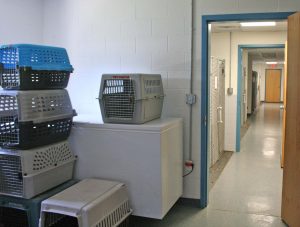
Kendra Peek/kendra.peek@amnews.com
The animal control side of the new Katherine E. Nelsen Adoption Center at the Danville-Boyle County Humane Society includes portable kennels for dogs, and large dog runs for dogs brought in, as well as an isolation area for momma dogs and their puppies, or for more aggressive dogs.
“Debbie and I work the whole county. If something is going on in Perryville and we’re on the other side of Danville, by the time we get there, the dog’s already back in (the owner’s) yard. Those people still get mad at us,” Hambel said.
“We’ve got to actually see what’s going on,” McCowan said.
Their powers are limited in some cases — one complaint doesn’t give them the right to take action against a pet owner.
“We get calls, ‘You need to take that dog away from people.’ Occasionally, we do. Just like the police get check welfare calls … there are times when we’ve taken dogs and cats and horses. You can’t just go up and ‘solve’ the problem right there on the spot. You’ve got to work through the courts,” Turcea said. “You just can’t take a dog away from them. People don’t understand that.”
They can leave warnings — and do — and after several warnings have been issued regarding a dog running free, they can take the case to the county attorney’s office, where action can be taken.
“We don’t care who you are,” McCowan said.
The recent changes in the county’s animal control laws have helped, Turcea said.
Beyond his work as animal control officer, Hambel is a constable, which “helps,” McCowan said. He can write criminal complaints and summons, same as law enforcement officers.
“Because I am fortunate enough to be a constable, that helps. The constable has the powers of the sheriff. Ninety-nine percent of the time, use it for animals,” Hambel said.
Turcea said that was something to point out — that they “don’t go around looking for trouble.”
“We don’t go around looking to stick our nose in … We respond to citizen’s concerns and complaints. That’s what we do,” he said.
Sometimes, people don’t care about that, they just want the “problem solved immediately.”
“The same person would never in a million years go to Walmart and be rude to the lady behind the counter. None of us would.”
They try to find a solution without having to cite people right away. Education, Hambel said, is sometimes the solution, as with a dog they removed a few weeks ago, returning it to the owner after educating them on the proper living arrangement for the pet, and with check ups to ensure it was being taken care of.
“That is good, the education part. A lot of people adopt a dog and they don’t know,” Hambel said.
A lot of people, McCowan said, still say “it’s just a dog,” a mentality that is slowly changing.
And if it’s a dire situation for the animal, they don’t delay in acting.
“If the dog is really (in bad shape), we don’t hesitate to take it. In a heartbeat,” McCowan said.
‘Remember the bad’
“You remember the bad ones, like any job,” Turcea said. “If it just doesn’t sound right to me, I will insist they take a police officer with them.”
Sometimes, McCowan said, it’s hard to not get angry with people in the way they are treating their animals.
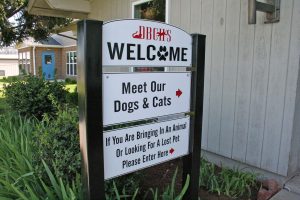
Kendra Peek/kendra.peek@amnews.com
A new sign welcomes visitors to the Danville-Boyle County Humane Society, and directs them where to go when seeking out a lost pet or bringing in an animal.
“He calms me down,” she said, motioning toward Hambel.
There have been other hard ones, they said: situations where a person has been deceased for several day and there are animals in the home.
“That can stick with you,” Hambel said.
McCowan said it’s best to try to forget — even if it’s hard.
“When you get home, you’re still picturing all of it in your head. You just try to forget and go on to the next day,” she said. “You do the best you can. People have to be — this job, it’s hard to do. People don’t understand, this job is hard.”
One of the hardest things they have to deal with is euthanizing animals.
McCowan said they get questioned how they can put an animal to sleep, “How can you do that?”
“We don’t like it. We never will like it. We’ve got feelings, too,” she said. “It has to be done, when you have an injured animal, or something like that. Anything like that — when you have to put something down — you never get used to something like that.”
“It’s taking a life and no body likes that,” Hambel said. “Unfortunately, it’s part of the job … you don’t have a choice.”
“That’s the worst part of the job.”
It’s also trouble when there’s overcrowding at the shelter, because that means they have to make room.
“We’ve had police officers find dogs at night, and you meet them here and you’re thinking, ‘Oh my god, where am I going to put this, I’m full.’ I’ve put them in the bathroom, seriously, I’ve put them in the bathroom, because there’s no room,” she said.
The new shelter, named the late Katherine E. Nelsen Adoption Center, after the late former director of the Danville-Boyle County Humane Society, has made a big difference, they said. It has a section just for McCowan and Hambel to pull their vehicles in, and an area just for the dogs they pick up to be held, until they can be vetted and cleared for adoption.
There are pet fosters, which helps with that issue, as well as people who help transport animals to meet rescue organizations or other adoptees. The shelter also takes animals to PetSmart in Nicholasville to adopt out.
“There are a lot of people that want to help,” Turcea said. “We do euthanize animals here, and for the foreseeable future, we will. But that is not our first priority — that is not what we want to do. We do try to help. We do try to find an outlet for the animals, we do try to get them back where they came from. We do try to find them homes.”
Social media and a great network of volunteers through the Danville-Boyle County Humane Society have made a big difference, he said, in increasing the adoption and save rates at the shelter.
“We make room for the next one. There’s never not been a next one. You make room for the next one in a variety of ways, some of them good, one of them not good,” Turcea said. “What you do is, try to maximize the good outcomes. It’s very simple.”
“This job, it takes a person with a good heart. But you’ve got to think with your mind, too, not just your heart,” McCowan said. “I was told that early on, ‘You’re gonna get bit if you keep thinking with your heart.’”
Animals keep them going
“There’s something about the animals,” Turcea said. “You don’t think about it — animals don’t know when it’s Thanksgiving, they don’t know when it’s Christmas, they don’t know when it’s 3 in the morning. So if you sign on, you’re signing on for 24/7 in some way or another … it’s the nature of the job.”
“The animals don’t go home, eat eat supper at 6:30 and go to bed at 9; they just don’t do that.”
At the core, all three love animals, that’s part of what keeps them going.
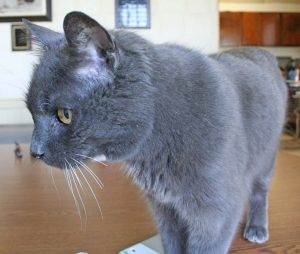
Kendra Peek/kendra.peek@amnews.com
R.C. is an older cat that has made the shelter home. McCowan called him “Dan’s cat,” referring to Director Dan Turcea, and said R.C. had never stayed a night in the cat kennel area, but had been the office cat since being brought in as a kitten.
“I love animals and I love when something good comes out of what we’re doing,” Hambel said. “When they get reclaimed — that’s one of my favorites.”
They love the cases where owners are reunited with their lost pets, and sometimes play a part in that. Or when strays find new homes and new lives.
“Stuff like that is good,” McCowan said.
There have been times they have adopted animals themselves, but it’s very rare.
“You learn pretty quick, you can’t do that. First of all, you don’t have time. Second of all, you don’t have room,” she said. “You want to. You want to really bad.
“You’ve got to use common sense, what you can take care of and what you have time for.”
At one time, both McCowan and Hambel had dogs that would ride along in their trucks, and both dogs have since passed.
“If I find a dog that fits that — or finds me — I would then,” Hambel said.
They do have office pets: a cat named R.C., which McCowan called “Dan’s cat,” and a Chihuahua named Trixie.
R.C. was found in a garden at about six months old, and was brought to the shelter. The lady who found him, thought he was sick, but “he was just sunning,” she said.
“I don’t think he spent one night in the cage,” McCowan said with a grin.
“I’ll probably end up taking her home,” McCowan said, as the dog snoozed on her lap.






